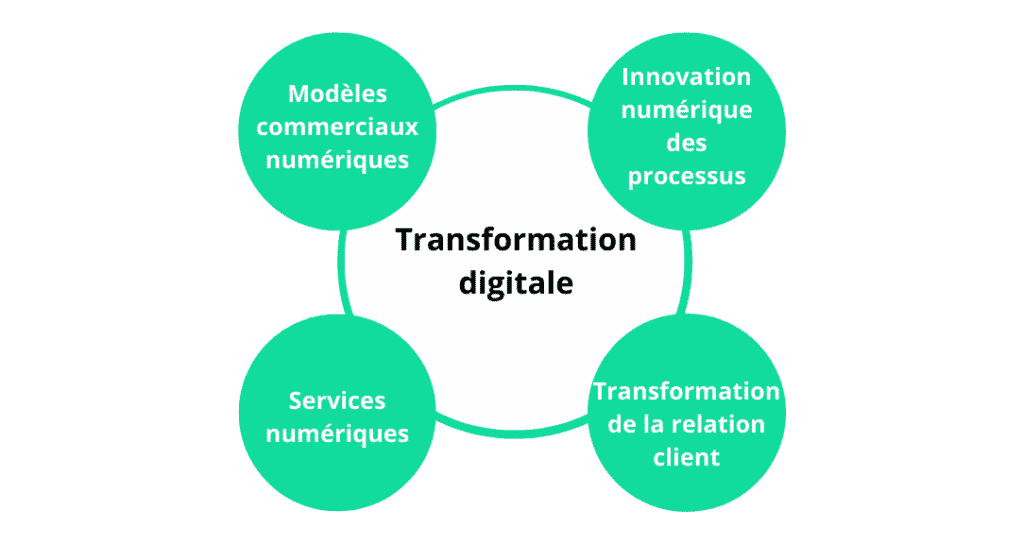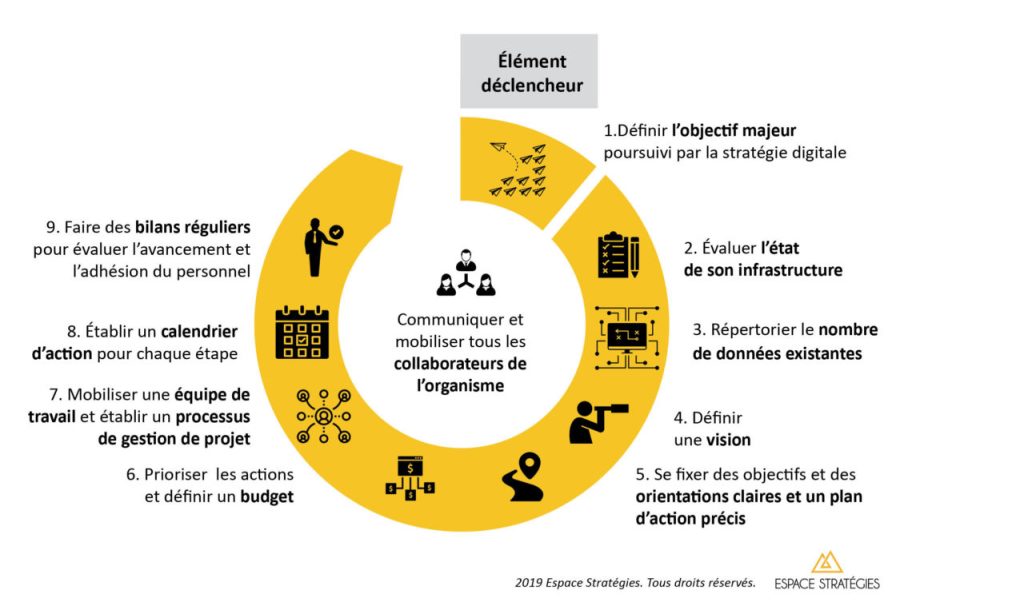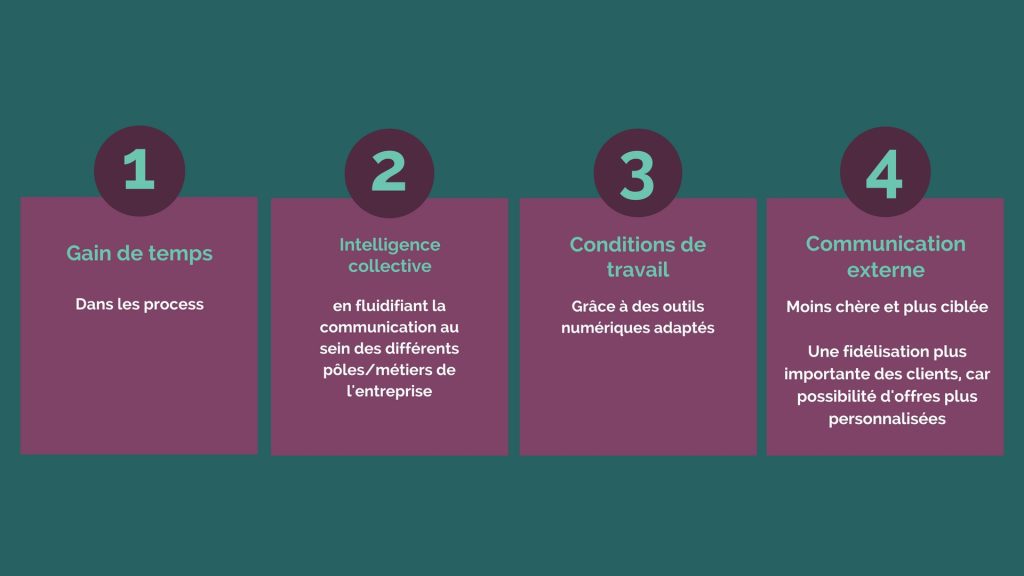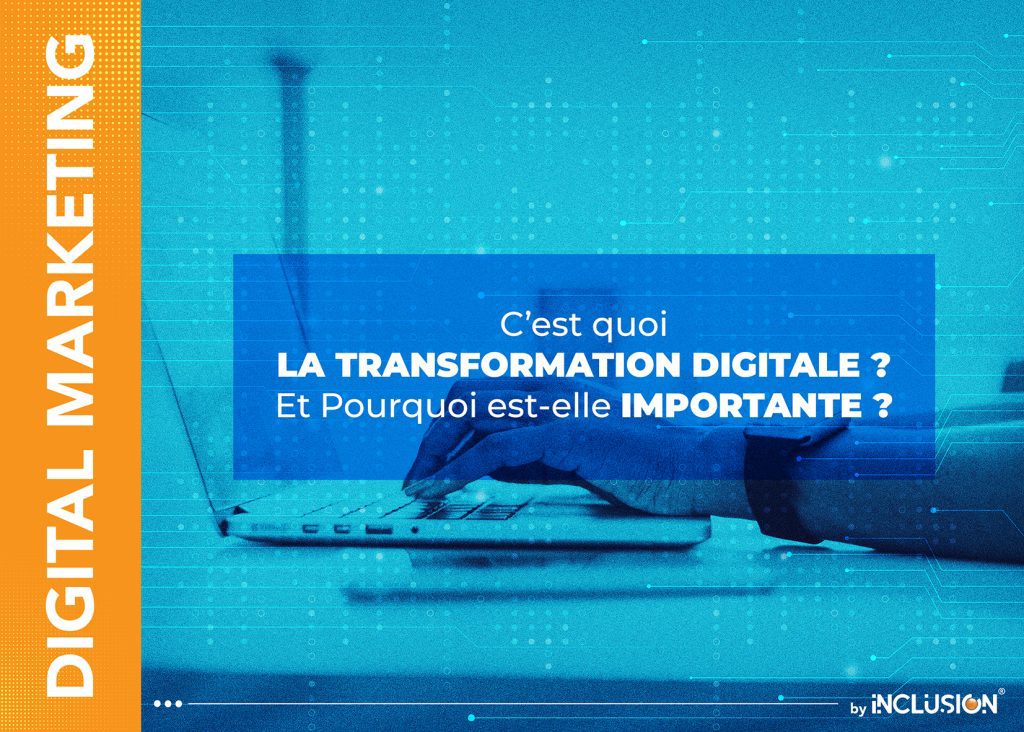What is digital transformation?
Digital transformation is the integration of digital technology into all areas of a business, fundamentally changing how you operate and deliver value to customers. It is also a cultural change that requires organizations to continually challenge the status quo, experiment, and become comfortable with failure.

Why is digital transformation important?
In today’s world, digital transformation is no longer a beneficial option; it has become a necessity for the survival of any business that wants to endure.
Digital transformation involves implementing more efficient work processes by incorporating new methods focused on customer satisfaction. All these changes naturally come with a relatively high cost, representing a true investment for companies. However, it proves to be a necessary investment in the long run.
7 steps to successfully achieve your digital transformation
1. Conduct a digital audit of the company's current state
Before embarking on a digital transformation project, it is essential to assess the existing digital environment of a company. Digitalization is not measured by the number of available technologies but by how these tools are used within the company, and its ability to implement strategies, organizational structures, and ways of working.
It is also important to identify factors that hinder innovation within the company. Solutions must then be considered to overcome these obstacles.
Here are a few questions to guide you:
– What digital tools have been adopted by the company?
– Which of these tools have created value?
– What obstacles need to be overcome to enable a smooth and sustainable adoption of digital practices within the company?
2. Review the strategy
A digital transformation project makes no sense if it is not integrated into a reflection on the company’s overall strategy.
Initiating such a project is an opportunity for a company to review its core values—such as company culture, business model, and strategic policies—through the lens of opportunities offered by digital technologies.
This comprehensive reflection should then involve all stakeholders in the company, from various departments and roles, so that the digital transformation aligns closely with their daily challenges.
It would also be wise to consult external experts to better reassess the strategy and develop a roadmap with measurable objectives. Feel free to reach out to inclusion for assistance with this process.
3. Automate business processes
Today’s businesses generate and accumulate an unprecedented amount of documents and information dispersed across various platforms. The duplication of tasks related to office and administrative management, such as verification processes, signatures, and data integration, are low-value tasks that waste time and reduce productivity for the company and its employees. Enterprise Content Management (ECM) is the backbone of a company’s digital transformation, enabling it to automate business processes and manage its content. Solutions such as workflow, case management, or more recently, Robotic Process Automation (RPA), help businesses increase productivity and efficiency.
4. Rethink your internal organization in favor of collaboration
A company’s digital transformation project is an opportunity to improve its products and services and optimize its work methods. Digitization enables tools that facilitate communication, responsiveness, productivity, and collective decision-making among teams and departments.
5. Promote agile work styles
Digital technology has enabled Agile and Scrum methodologies, promoting flexible project management, a focus on the customer, and attention to project progress and outcomes. This agility is accompanied by real-time responsiveness facilitated by new technologies, allowing us to provide faster, more efficient, and higher quality responses to the needs of partners and customers.
6. Master your data
The data created, collected, and stored by a company is a valuable resource as long as it is analyzed, classified, and protected in accordance with current regulations (GDPR). The benefits of data processing and analysis enabled by an Enterprise Content Management (ECM) solution are enormous, including better understanding of customer needs and satisfaction, the ability to improve products and services, centralized information, and increased productivity. Enhanced competitive advantage…
7- innovation
By taking these steps, the company initiates a fundamental, strategic, and/or organizational approach that includes people, tools, and work methods. Enabled by digital tools, this fundamental approach is primarily based on continuous openness to innovation, collaboration, and mastery of business processes and data.

What are the objectives of digital transformation?
Digital transformation enables an organization to better serve its key stakeholders: customers, employees, partners, and shareholders.
The integration of computerized digital technologies into business operations helps organizations to:
– Accelerate time-to-market with new products and services, increasing employee productivity.
– Enhance responsiveness to customer demands.
– Gain a better understanding of individual customers to better anticipate and personalize products and services.
– Improve customer service, particularly by offering a more intuitive and engaging customer experience.

What are the technologies of digital transformation?
Technology both drives the need for digital transformation and supports the digitization of an organization. Although no single application or technology enables transformation, several digital transformation technologies are essential for digitization:
Cloud Computing: Allows an organization to access software, new features, updates, and data storage more quickly, from anywhere and at any time.
Commoditized IT: Enables an organization to focus its investments and human resources on IT customizations that differentiate it in the market.
Mobile Platforms: Allow work to be done from anywhere and at any time.
Machine Learning and AI: When powered by comprehensive data programs, provide organizations with insights for faster and more accurate decision-making in areas like sales, marketing, product development, and other strategic domains.
Automation: Such as RPA (Robotic Process Automation), deploys bots capable of handling mundane and repetitive tasks more quickly and accurately than humans, who are then freed up to pursue higher-value work.
Emerging Transformational Technologies: These additional technologies help organizations move faster, work more efficiently, and create new products and services, including:
- Blockchain
- Augmented Reality (AR) and Virtual Reality (VR)
- Social Media
- Internet of Things (IoT)
- Edge Computing


